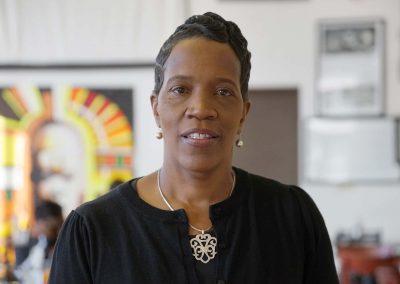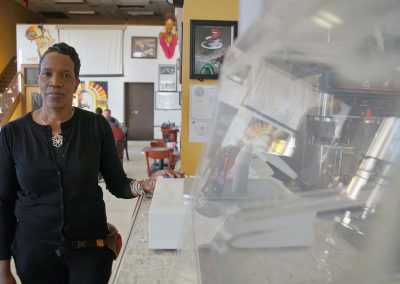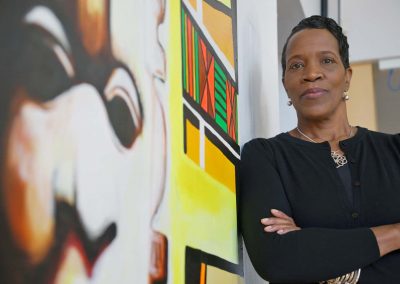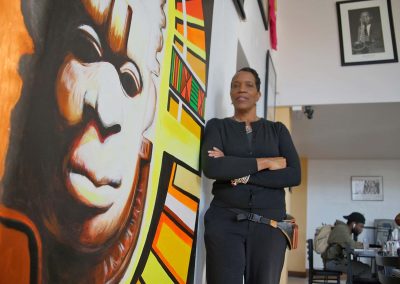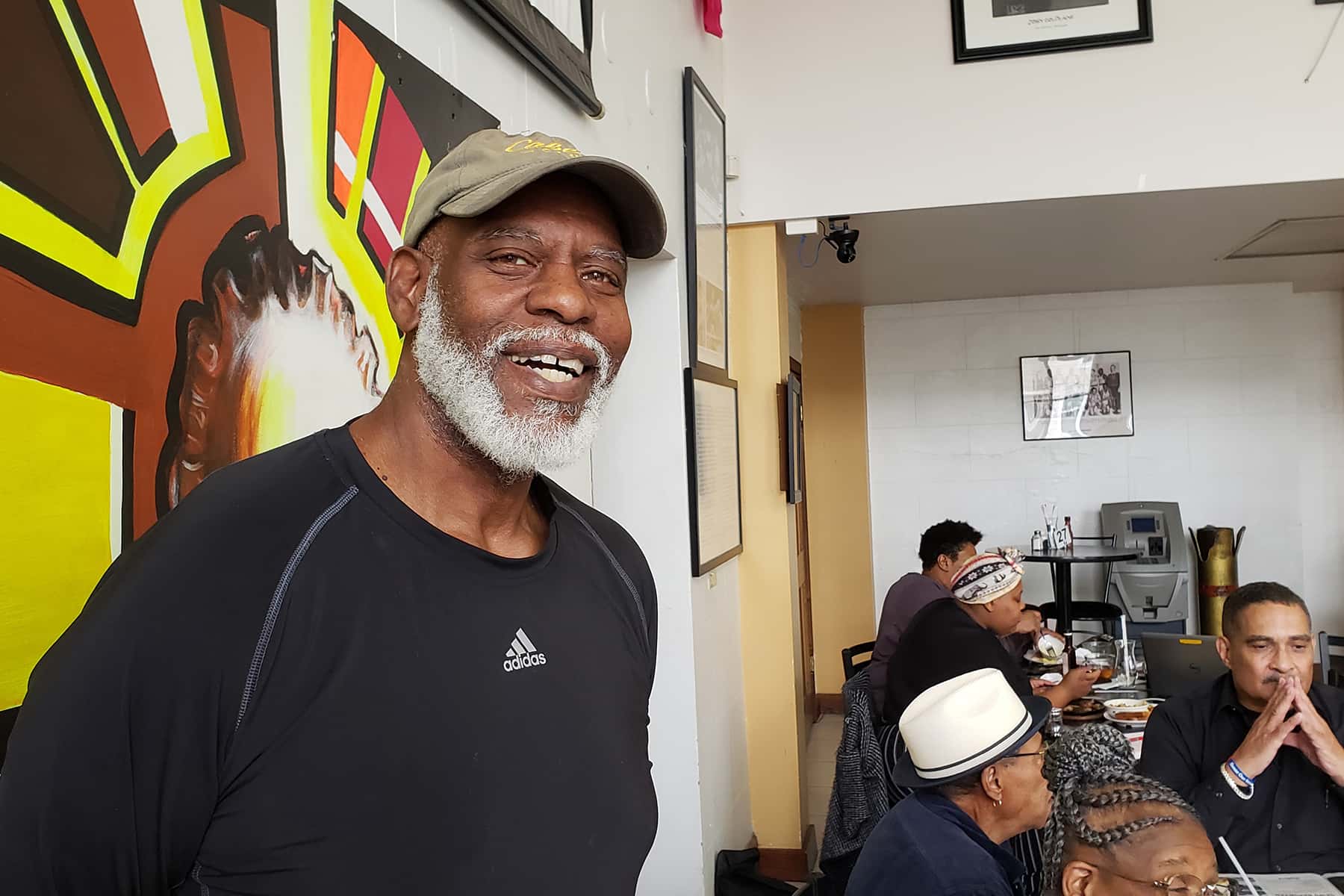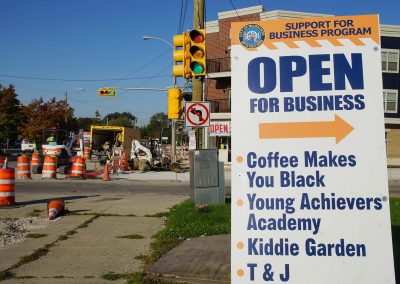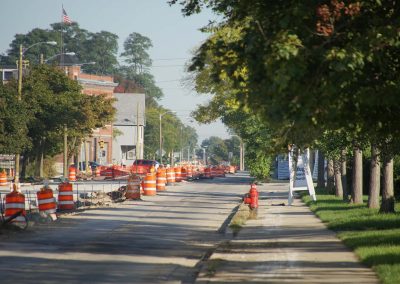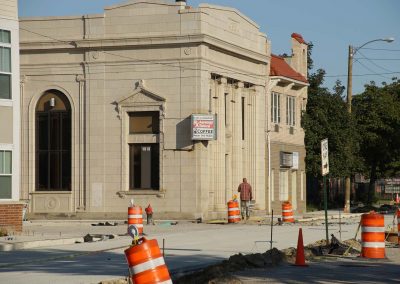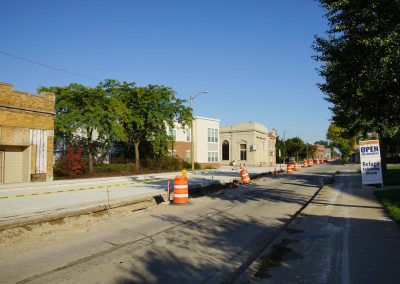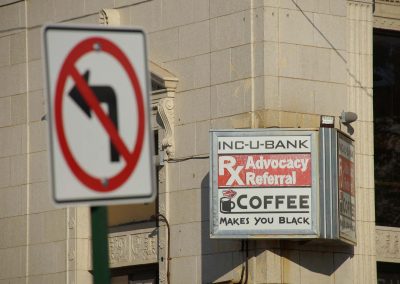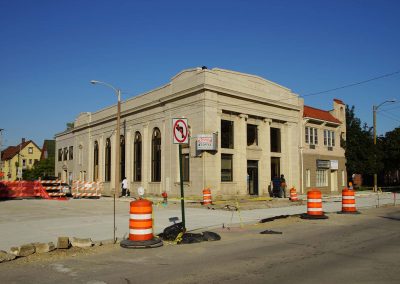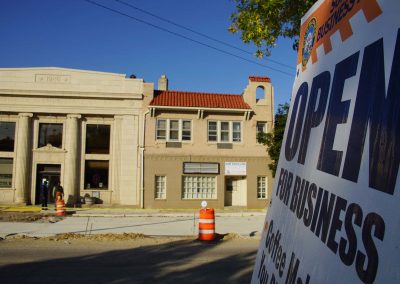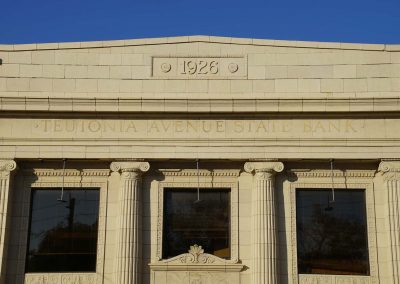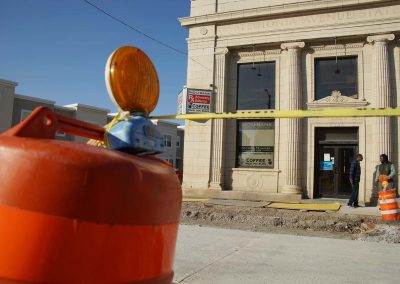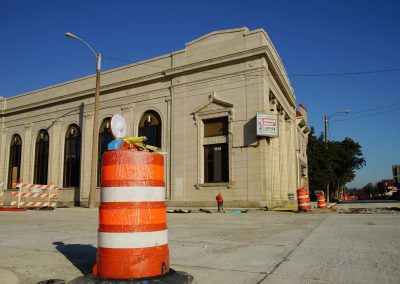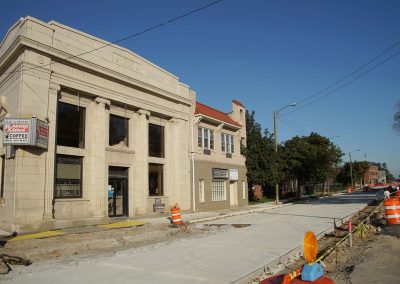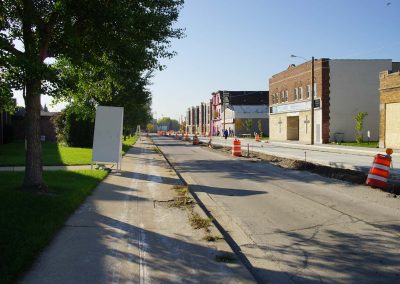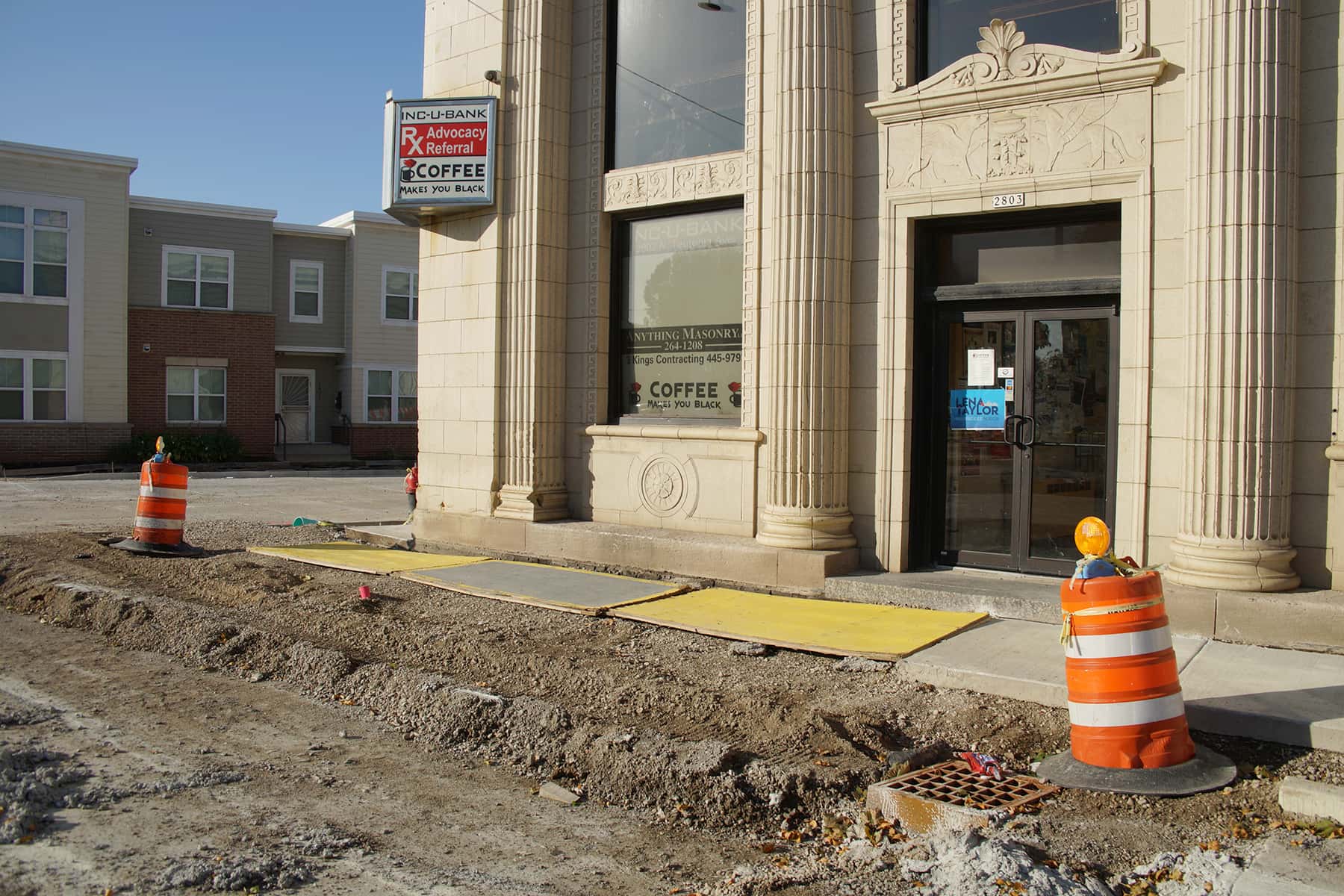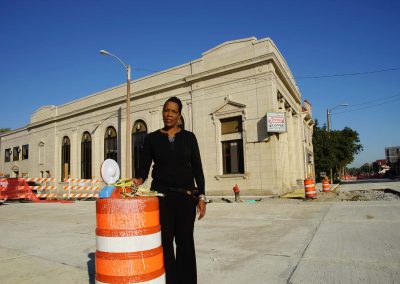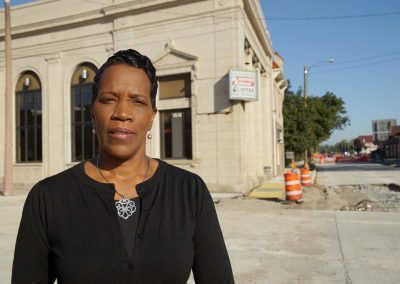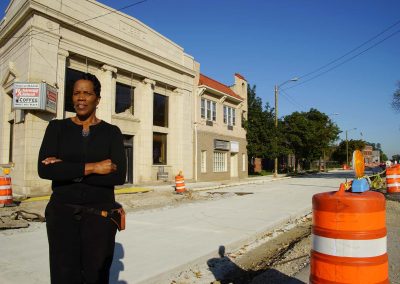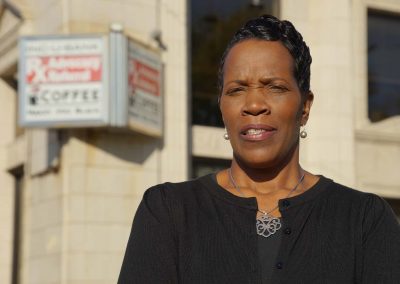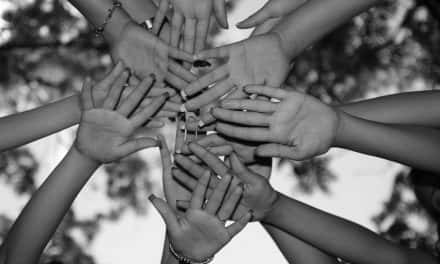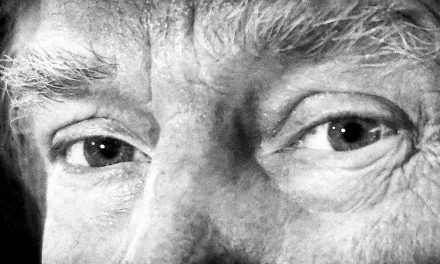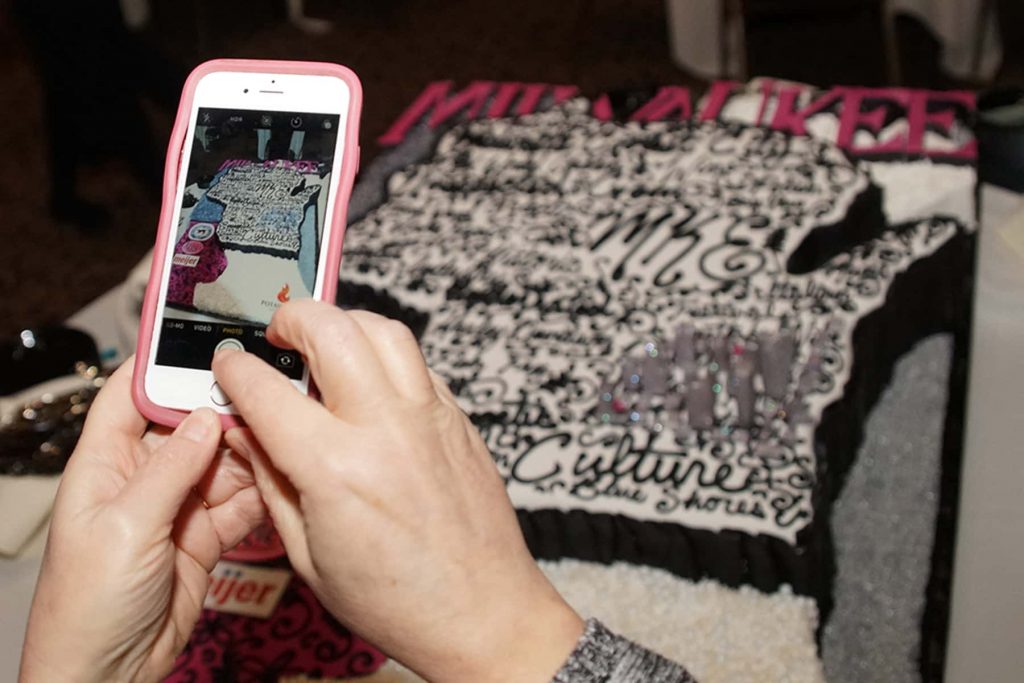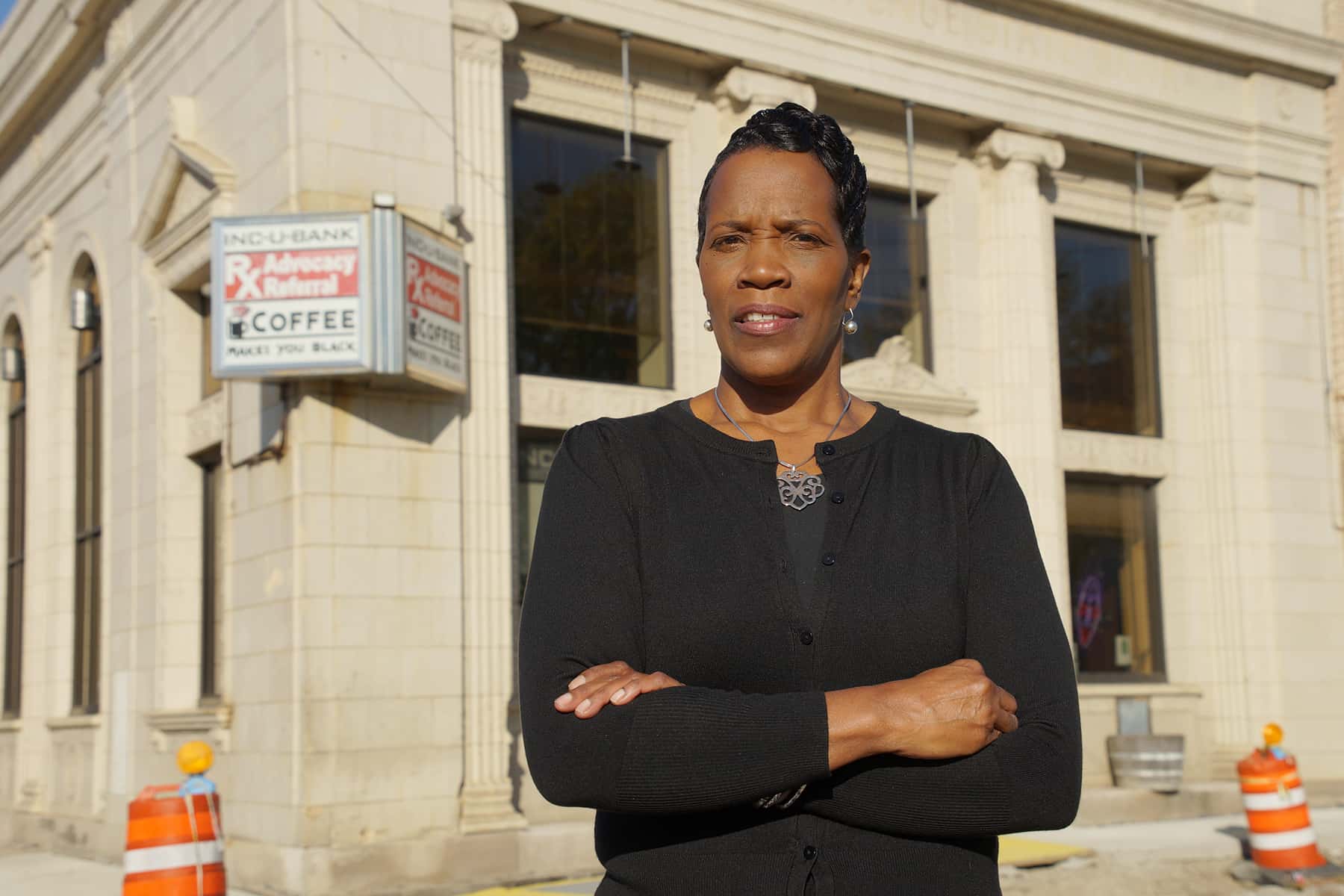
It used to be a bank, an insurance company, and a drug rehabilitation center. But for the past eighteen years, it has been a beloved community hub serving up coffee, culture, and chicken and waffles. But when road reconstruction began on Teutonia Avenue in May, it became harder for Coffee Makes You Black – and surrounding businesses – to serve its customers, who for many months have had to decide whether to park farther away and navigate the torn-up streets and sidewalks or find sustenance elsewhere.
In fact, to date, four daycares and a candy shop have had to close. When two women heard a local news station report in September that the restaurant was also “on the verge” of closing, they were determined to do a little reconstruction of their own and host a weekend “cash mob” to prevent that from happening.
“Prior to the first news report, there had been no work done on the street for days and days,” says Bradley Thurman, co-owner of Coffee Makes You Black, who had gone out each day to take photos and video. The project is overseen by the Wisconsin Department of Transportation and the Milwaukee Department of Public Works. Bradley said it is referred to as a “sixty-year project,” designed to revitalize the street and make it possible to be sustained and improved for decades.
According to the website of the Milwaukee DPW, who did not return a call for an interview, the project extends from West Garfield Avenue to West Groeling Avenue and consists of “removing the deteriorated pavement and replacing it with new concrete pavement, curbs and gutters, and driveway approaches.” It will also implement traffic calming measures, new curb ramps and street lighting, and will eventually feature “one driving lane, bicycle lane, and parking lane in each direction.”
Bradley was frustrated at the lack of work being done for long periods of time. “There was nothing,” he said. “Then, after the press, the work resumed very quickly. Just like that, we had a new sidewalk.” Apparently, the viral news had reached the DOT and the DPW, as well as community members far and wide.
When Milwaukee native and musical artist Seshat Roberts, now living in New York City, saw report online in September, she immediately called her good friend Lilo Allen, a local Milwaukee poet and business owner of Papyrus & Charms, who happened to be reading about the problem when she called. In no time, they had planned, promoted on Facebook, and garnered two thousand RSVPs for a weekend cash mob at the end of the month.
For Lilo, Coffee Makes You Black has long been more than a space for her to work and hang out with friends. Last November, when a vandal smashed the front doors and stole the cash register, Lilo went straight to social media and got the community to help. For her, the restaurant is “one of very few spaces in the city that is authentically Black, from the food and staff to the decor and music, a space where Black folks can walk in and see themselves represented.”
She explained that because Black residents do not always feel welcomed in all Milwaukee spaces, it is “important to have a place where we don’t have to worry about that and important for the city of Milwaukee, as it grows, to retain its cultural identity.”
Because she is a business owner herself, she believes it is important for businesses to support each other whenever they can. “It’s all about ujamaa, or cooperative economics.” The fourth principle of Kwanzaa, ujamaa celebrates shared community wealth.
Bradley and his wife and co-owner Laurie Henderson Thurman also noted that the name of their shop is “our way of saying that it’s okay to be Black,” explaining the origin of the name, something I had puzzled over many times. Bradley remembered his mother scolding him as a child whenever he’d ask for a cup of coffee: “Go on, boy. You know coffee makes you Black.” This old wives’ tale, well-known in the American South, refers to a time, he explained, when, if your skin was “darker than a paper bag,” you had less of a chance to be hired or respected. Therefore, coffee was avoided like the plague. Despite the sad origins of the phrase, they have reclaimed it for themselves and their customers, no matter the color of their skin.
Not surprisingly, both of them were overwhelmed by the amount of ujamaa displayed on September 28 and 29. “Thanks to the cash mob,” said Bradley, “we’re back to level ground after serving upwards of 800 customers that weekend and making two times what we typically make, plus donations, on a normal weekend.” Rent and bills are paid.
For the entirety of both weekend days, the restaurant was filled to capacity, with long lines winding around the walls. Wait staff, cooks, and volunteers scurried from table to table in a non-stop effort to serve hundreds of long-time and new customers. I know this because I myself donned an apron, a rag, a serving tray, and ticket book for three solid, sweaty hours, squeezing in short conversations with friends and smiling at every request for more coffee or a bill.
Laurie, who has run the restaurant for the past six years, credits the love from the community to what she and Bradley have been trying to offer since 2001. “I find joy and purpose,” she said, “in helping others who are in need and seeing them grow.”
That extended past the breakfast and lunch service to looking after her staff and engaging customers with conversation, an ear, and even prayers. That is why she is known to many as “Mama Laurie.” So when Allen and Roberts organized the cash mobs, she no longer had to wonder, as she sometimes does, “Do we even matter? If we closed down tomorrow, would we be missed?” Instead, she can rest easy in the fact that they are “more than just a restaurant.”
For Bradley, what brings him joy is “the thought of being in the mix to make even a little improvement. So does seeing the community want to support us in a time of need. I think part of why so many people came through our doors that weekend is because we’ve always done what I call ‘fringe’ projects.” Not only does the couple host community forums and local politicians, including Governor Tony Evers during his campaign, they display the for-sale work of many artists.
He also told me that this summer was the twenty-fourth consecutive year of what was originally called the “Father-Son Fishing Trip,” which Bradley has run as a program of Coffee Makes You Black. Beaming with pride, Bradley explained that “the campers are mostly boys now, with fewer fathers, but this year alone we took 61 boys and 19 adults to my four-acre patch of land on the Mississippi, about thirty miles south of La Crosse. We camp, fish, take out canoes and the pontoon – a lot of things that the boys have never done before. And it’s all free. I learned from Minister Farrakhan at the Million Man March that if a million men went home and supported a million young men, then the world would be a better place. So we camp.”
Coffee Makes You Black plans to continue camping out on the corner of Teutonia and Hadley despite the almost eight-month timeline of the Teutonia Avenue project – which is on schedule now but still not expected to be completed until December – and the loss of thousands of dollars in revenue. Bradley said that when they decided they were not going to close, they would move forward with an ambitious expansion project that he has been thinking about for over a year. He hired DreamBuilders architect Nick Robinson, one of only eight licensed African American architects in the state’s history and the emcee at the inauguration of Governor Tony Evers. Bradley was inspired when he saw that Robinson had worked on three university rooftop project. “I knew he was our man.”
The plan is to “redesign the second floor and install a main kitchen and dining hall that will serve 100 to 200 more customers, then build up a third floor with a service kitchen and outdoor rooftop patio. That would mean expanding the building into the lot just to our west and relocating the current second floor office tenants to the building just north of us, which we also own.” The architectural rendering, showing what the modern, glass-enclosed third floor would look like at night, can be viewed at the front of the restaurant. Bradley dreams of creating a major event space since there are “few to none in central parts of the city other than church basements.”
The rendering also shows a Coffee Makes You Black entering a new era. Built in 1926 in Neo-Classical Revival style, the Teutonia Avenue State Bank operated until 1958, after which it housed a plethora of institutions, including a life insurance company, the Social Development Corporation’s Inner City Development Project, and the ACLU. At other times, the community used it as a drug rehabilitation center, and the Nation of Islam held meetings there. It remained vacant for fifteen years, however, until Bradley and Laurie opened their restaurant in 2001.
Bradley’s ambition is not surprising. A retired firefighter who served for sixteen years, he took advantage of the eight-day-a-month firefighter schedule to run different businesses on the side, including a power washing company and a semi-truck tire lock company. He owned a bed and breakfast for a time and even worked as a road-killed deer collector for the DNR. But he said his biggest experiment was trying to get into the coffee business after visiting Seattle in the 1980s. A long trip to Jamaica to learn about harvesting and roasting beans did not end up panning out in the end, but Bradley still owns, whether he likes it or not, a two-ton German coffee roaster that now serves as a planter in the restaurant.
Nonetheless, the entrepreneur kept dreaming. And his wife Laurie, as she said, keeps supporting his dreams. Together, they have created a busy but welcoming space on Teutonia Avenue that is not going anywhere soon, street construction or not. The love and support of a community that has received so much from them has ensured Coffee Makes You Black will remain part of the neighborhood’s bedrock.

